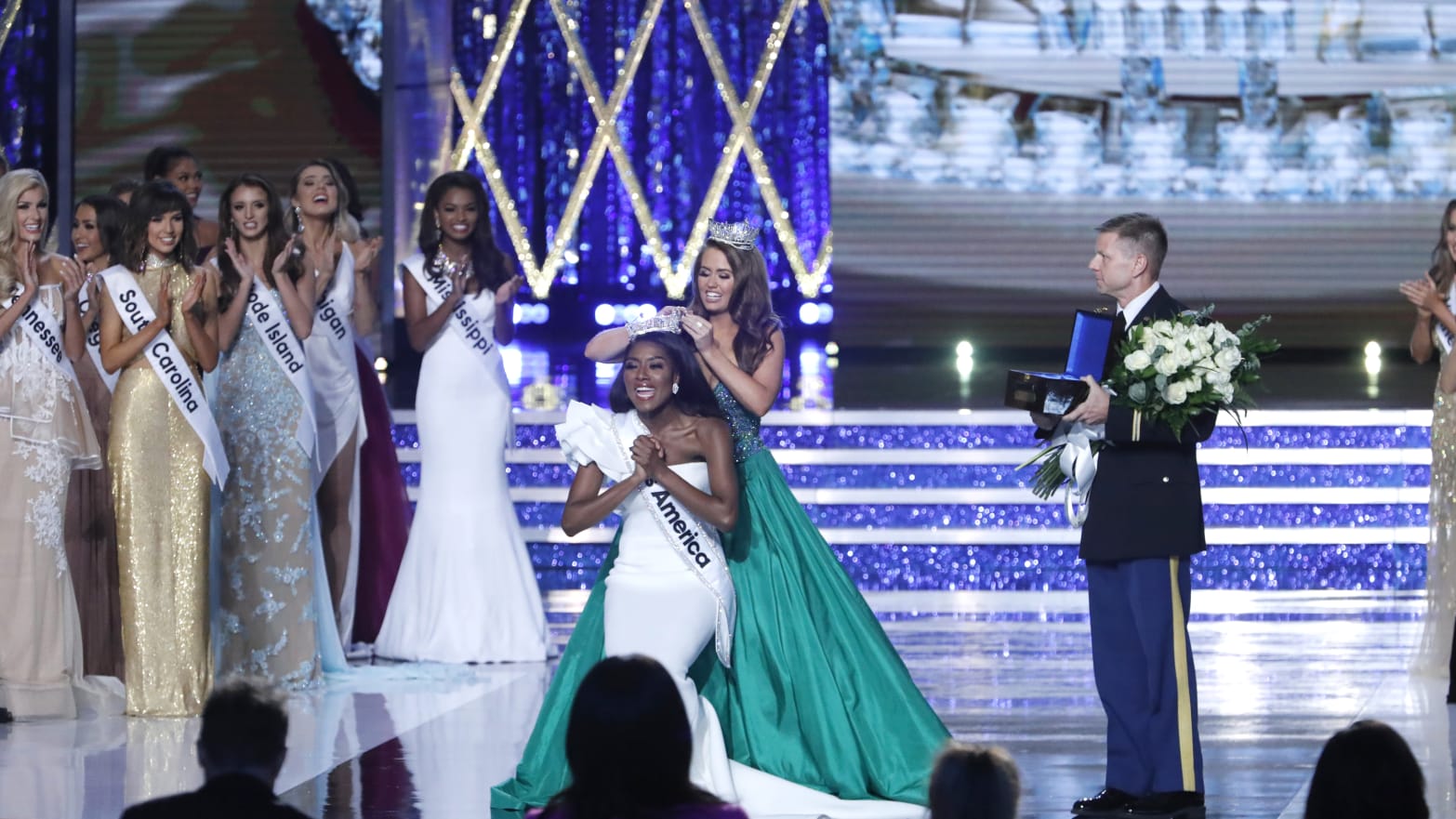On Sunday night, the women’s liberation movement unexpectedly reached its zenith at Atlantic City’s Boardwalk Hall. The event? Miss America 2019, aka Miss America 2.0. The playlist? Girl power pop. The host? A woman from Dancing With the Stars whom I’ve never heard of. The empowerment? Off the charts.
If following niche pageant drama has fallen off your priority list lately, let’s catch you up. In December 2017, HuffPost published a scathing exposé which included offensive, unprofessional emails sent and received by Miss America CEO Sam Haskell and other top executives within the organization. In the wake of the article, the board was completely overhauled, with Gretchen Carlson becoming the first former Miss America to take over as chairwoman.
Carlson oversaw huge changes to the pageant, and made more than a few enemies in the process. The total rebrand included cutting the infamous swimwear portion of the event, and prioritizing brains and talent over physical appearance. In fact, it’s not even a “pageant” anymore—it’s a competition, in which “candidates” use their words, “social impact” initiatives, and dance routines to take home the crown. But as The Daily Beast previously reported, “Relegating the bathing suit event to the dustbin of history sparked a rebellion among the extensive network of volunteers that keeps the pageant afloat. With just two weeks before the pageant [got] underway in Atlantic City, 22 state organizers have called for Carlson’s resignation. And… in a letter to state organizers that she posted on her Facebook page, the current reigning Miss America, 24-year-old Cara Mund of North Dakota, blasted Carlson and the board she heads for silencing her and imposing talking points about making Miss America relevant again.” (Gretchen Carlson responded to Mund in a statement, saying, in part, that she had never “bullied or silenced” her.)
Tensions in Atlantic City were high in the lead-up to the competition. According to reports, anti-Carlson posters were spotted across town, and “A ‘Gretchen Sucks’ sash was placed on the statue of Miss America outside Boardwalk Hall.” Given the drama and full-scale rebellion that Miss America 2.0 has already incited, I tuned in Sunday night expecting something exciting. Instead, I watched a two-hour group job interview. Overall, Miss America 2.0 was a good 50 percent less offensive than the average pageant, with 100 percent more pantsuits. Was I confused and very overwhelmed by the rapid-fire content, sharp tonal shifts, heartfelt 20-second speeches about women in STEM, and spoken-word poetry? Yes. Did I wish that it was longer? Oh God, no.
The defining characteristic of Miss America 2.0 was how often its participants were contractually obligated to say the words “Miss America 2.0”. The show opened on a stage full of contestants organized into clumps. As the camera panned to the groups, members would shout out adjectives and nouns: “diverse” “sisters” “future leaders,” etc. “We are Miss America 2019,” they insisted. “We are empowered.” Next, every candidate got to introduce herself, usually by mentioning her college, major, career goals, and state. That was until Miss Michigan stepped forward and explained that she hails from a state “with 84 percent of the U.S.’s fresh water, but none for its residents to drink.” Miss Michigan majors in dropping the damn mic! Otherwise, this segment was incredibly boring—everyone looks the same, and the only choreo was smiling and walking in circles.
Already, host Carrie Ann Inaba was stressing that Miss America is a “job,” and one that makes a substantive difference. We check in on co-host Ross Mathews, who has been banished to the audience. Thanks to preliminary judging, a huge swath of the candidates are eliminated right off the bat. As the top 15 are announced, little videos in the bottom of the screen tell us more about our candidates. They’re largely career-focused—Miss Washington wants to become an investigative journalist because “investigative journalism is not dead,” Miss Oklahoma wants to be a human-rights attorney, and Miss Connecticut has fallen in love with the concept of regenerative science. Miss Idaho is all about diversity, Miss Florida defies gendered expectations/stereotypes, and Miss Indiana’s mom came out as a lesbian! It is immediately clear that this is not your mother’s Miss America, unless your mother is a lesbian.
Mathews is still in the crowd, having words with a woman who was crowned 70 years ago. “1948. A lot has changed!” Mathews announces. This very well-trained woman agrees, and talks about all of the progress that women have made, as exemplified by the elimination of the swimsuit portion of the Miss America pageant (sorry, competition). We meet the judges, a fun and haphazardly assembled group of C-Listers, children of A-Listers, Wilson Phillips members, and a man named Bobby Bones.
It’s time for “tonight’s first job interview,” in which candidates will answer questions that have been written for them by their competition. This innovative segment quickly yields one of the most perfect soundbites of the night, from Miss Washington: “I want everybody to know when I walk into a room with a crown and sash that I advocate for wheelchair adaptive sports.” At one point during her 20-second answer, Miss Minnesota casually mentions her “talent” is a self-choreographed piece in which she DANCES WITH A GHOST.
All of these women are clearly intelligent and articulate, but ask anyone to answer a complex question in 20 seconds and they’ll wind up sounding like an idiot. “As a woman in technology,” Miss District of Columbia reveals, “I am empowered by technology.” A contestant is given a third of a minute to disclose the most difficult thing she’s ever had to do in her life.
Thanks to the mercifully brisk pacing, we’re already meeting our top 10. Some idiot decided to cut the woman who just teased a ghost dance, which has me quickly losing faith in Miss America 2.0. Thankfully, Ross Mathews has been rescued from the crowd and is here to helm the red-carpet competition. The pageant’s new management has made some strong choices for this portion of the event. In order to make sure the segment is still centered on brains and personality, every contestant emerges in their formal wear, takes a few steps, and is asked a hard-hitting red-carpet question by Mathews. I’m all for elevating red-carpet conversations beyond hair and makeup, but this feels like over-correcting. Sample questions include “What do you want to tell America?” and answers range from sexual assault on campus to food insecurity to Miss Louisiana’s “divine purpose.”
But no quantity of non sequiturs or gaping evening-gown cutouts could possibly prepare me for the sheer zaniness of the talent competition. Obviously, candidates were more inclined than ever to bring their personalities to the stage, and boy did they ever. As someone who would much rather watch a talent show at a performing-arts middle school than a catwalk of half-naked women, I felt incredibly seen by this segment. To summarize a portion of the evening that really defied description, there was a self-written monologue, traditional Irish step dancing, and two separate homages to the 19th-century Hungarian composer and pianist Franz Liszt. Many candidates showed off their smarts by cleverly choosing talents that are very difficult to judge, like the aforementioned self-written monologue, which was about Miss Nebraska’s experience with being diagnosed with cancer at 19 and coming to terms with her own morality (I got chills!). Miss Colorado also wowed with a spoken-word poem entitled “Tending the Garden in My Chest.”
Apparently, our top five are New York, Louisiana, Massachusetts, Florida, and Connecticut. The only thing standing between them and the crown AKA the job offer is the final interview. Miss New York talks about how New York has prepared her for the title. When she said that she’s overcome “pricey rent,” I felt that. Judge Jessie James Decker wants to know what Miss Massachusetts would say to a man who doesn’t want to father his own child (what?). Bobby Bones introduces his question by talking about his own book. I hate Bobby Bones.
And it’s time to announce the winner! Mathews introduces the very controversial Miss America 2018, Cara Mund. In a brief appearance, Mund assures viewers that she’s going to keep supporting our troops, and she’s “just getting started.”
After some truly painful waiting-for-results banter, Mathews and Inaba take us out of our misery and read out the runners-up. We’re left with Miss Connecticut and Miss New York, who stand on the stage clutching each other’s hands, laughing, grinning, and emphatically whispering words of encouragement. After two hours of rehearsed speeches, this feels incredibly refreshing and genuine despite the fact that I have no idea what they’re saying. Miss New York, Nia Franklin, wins, and Cara Mund rushes on stage to pin on her tiara, accompanied by a soldier (?) who is holding a box of hairpins (?). Franklin, who performed from the opera La Boheme during the talent portion and spoke eloquently about feeling out of place at a predominately white school, thanked God for her victory. “I’m feeling really blessed right now,” she said, shouting out her family and “all of my sisters behind me.”
I don’t know if a beauty pageant can really justify its existence in 2018, even an “empowering” beauty pageant where women get to keep all of their clothes on. That being said, I will watch Miss America for however many years it takes to finally see a contestant dance with a ghost.

